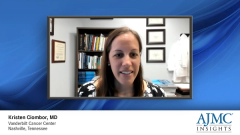
Emphasizing HER2 Testing as A Premier Diagnostic Approach To mCRC
Testing prioritization and frequency are highlighted in Dr Ciombor’s final insights for this HER2 biomarker focus.
Episodes in this series

Kristen Ciombor, MD: HER2 amplification in metastatic colorectal cancer is typically found in about 2% to 3% of all comers. However, if you see RAS wild-type disease, it’s enriched in that population. You can see it in up to about 5% or 6% in certain subpopulations of patients with metastatic colorectal cancer. When we think about how the pie is divided in terms of biomarker importance, what we previously considered rare is now very actionable and can affect patients. Fortunately, we can test for a lot of these things at the same time. Testing for this is essential.
When I do molecular testing, I typically do a next-generation sequencing panel or platform, which will often include HER2. However, you can also send it as an IHC [immunohistochemistry] test with FISH [fluorescence in situ hybridization] confirmation. That can be an easy way for someone who might otherwise not be doing next-generation sequencing or platform testing to get that information as well. I make sure that 100% of my patients are tested for HER2. Though, at the current time, we see that this is actionable in the RAS wild-type population. I make sure that my patients with RAS wild type are tested for this.
As far as barriers for providers in doing HER2 testing in colorectal cancer, our field is changing so quickly and we don’t always know exactly what to test for. That’s why we want to provide education around the importance and actionable alterations, because it seems like these are changing by the minute. It can be overwhelming to keep track of what you need to send for each patient with each tumor type, especially for practitioners who are treating all kinds of patients with different tumor types. Hopefully our guidelines are becoming clearer in this, and hopefully that will lead to more patients getting tested.
I occasionally see…issues with insurance coverage for next-generation sequencing and platform-based testing. Oftentimes, when we argue with insurance companies or explain what we need, it helps when you see more alterations that are truly actionable and not just making patients eligible for particular clinical trials. Also, the turnaround time of next-generation sequencing has decreased. Because we have both blood-based and tissue-based options, that’s an important benefit as well. Patients and providers may not be aware of the anti-HER2 therapy options. Most of these are in clinical trials, but even in national guidelines, such as the NCCN [National Comprehensive Cancer Network] Guidelines, there are anti-HER2 options available for patients who are HER2 amplified. It’s currently actionable and it’s an important thing to test for.
Patients who can’t get good molecular testing for metastatic colorectal cancer are at a disadvantage when it comes to their treatment. It’s true that not everyone will have an actionable mutation or alteration. But when you think about the negative and positive predictive biomarkers, including RAS, RAS mutations can tell us to not use anti-EGFR therapies. But even subsets of KRAS mutations are becoming druggable, such as KRAS G12C, and that may expand in the future.
Things such as HER2 are important to test for, even though they may seem rare in the colorectal population. It’s important to make sure that you have all of the actionable alterations covered in terms of testing so that you can truly personalize the patient’s care by their molecular testing and other factors, such as their comorbidities, goals, and preferences. Molecular testing is 1 piece of the pie in terms of how I consider what the best treatment is for our patient, but it’s becoming an increasingly important piece of the pie. Knowledge is critical in making sure that we’re treating patients effectively.
Transcript edited for clarity.
Newsletter
Stay ahead of policy, cost, and value—subscribe to AJMC for expert insights at the intersection of clinical care and health economics.












